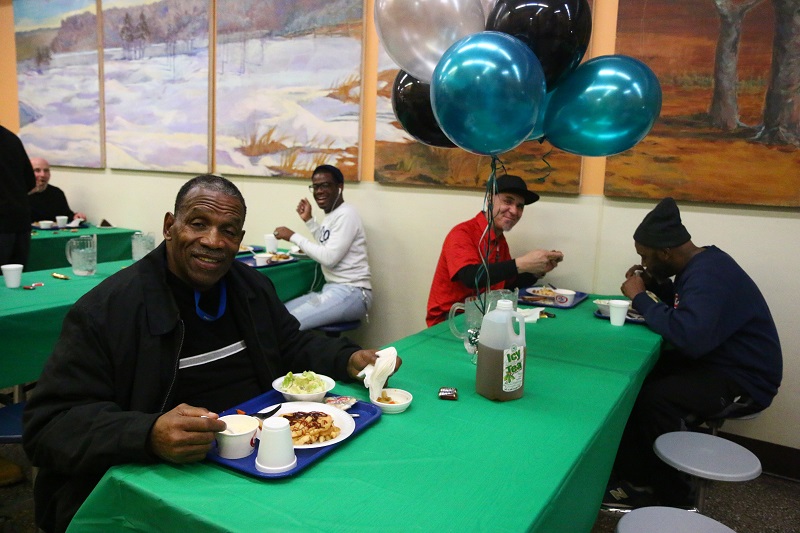
Residents of St. John’s Hospice in Philadelphia, an archdiocesan outreach to men experiencing homelessness, enjoy a clam chowder lunch Feb. 14, 2018. In response to the coronavirus outbreak, dine-in meals at the hospice have been replaced with to-go packages, as staff and clients adapt to new health protocols while “working together to care of brothers in need,” said director David Stier. (Photo by Sarah Webb)
As officials step up measures to contain the coronavirus, archdiocesan outreach workers are revamping their efforts to serve a particularly vulnerable population: individuals experiencing homelessness.
“This is uncharted territory for everyone,” said Martin Farrell, director of development and community relations at St. John’s Hospice, located at 1221 Race Street in Philadelphia.
Operated by archdiocesan Catholic Social Services (CSS) and a beneficiary of the Catholic Charities Appeal, St. John’s Hospice (SJH) offers residential services for more than 250 men transitioning from homelessness to independent living.
[hotblock]
The Center City facility also provides case management, on-site nursing, daily showers and a mail room for more than 1,300 men while serving some 300 hot meals each weekday.
As of this morning, none of the hospice’s staff, clients or volunteers had tested positive for the virus, said Farrell. Thirty full-time employees, most of whom are on site, continue to staff the hospice 24/7 according to a normal shift schedule. A few employees, including Farrell, have been working remotely.
Farrell said that hospice management had gotten a jump start on preparing for the outbreak, even before state and local authorities implemented sweeping closures of schools and businesses.
Earlier this month, director David Stier gathered extensive information from both the city’s Office of Homeless Services and the Archdiocese of Philadelphia, and “made good decisions” to protect the hospice’s clients, said Farrell.
One such decision was to replace cafeteria-style meals with to-go versions that can be quickly distributed to the site’s daily clients, whose numbers range from 150 to 300
In addition, hospice staff have asked volunteers and visitors to stay away until further notice. Since many already live in the four suburban Philadelphia counties, where non-essential travel has already been restricted, virtually no volunteers or visitors “have been able to come down since the end of last week,” Farrell said.
[hotblock2]
Farrell said St. John’s replies primarily on donations to sustain its outreach, but has shifted to collection methods that minimize interpersonal contact.
Staff members will now meet donors in front of the hospice to accept goods such as new bedsheets and pillow cases, as well as regular and travel-sized toiletries such as deodorant, toothpaste, shampoo, conditioner, lotion and hand sanitizer. Those wishing to drop off these items should call the hospice’s front desk at 215-563-7763.
St. John’s has also posted a wish list on Amazon that will enable supporters to purchase supplies for the hospice online.
Monetary donations, which can be made through the hospice’s website, will “help offset special costs associated with the coronavirus,” said Stier, adding that among these expenses are “special supplies and equipment, changes to procedures and staffing issues.”
Farrell said that the hospice continues to serve its clients, while working closely with officials and the archdiocese to remain in compliance during the rapidly evolving situation.
“Everything’s changing, day by day, hour by hour,” he said.
Stier said that there is “some nervousness” among clients, but also “strength and resilience.”
Drop-in clients have been understanding in receiving their meals at the door, rather than dining in the cafeteria, he said, and the hospice’s more than 50 residents have been helping to distribute the food.
“What is most obvious is that the men are working hard to cooperate with changes and to pitch in with work,” said Stier. “We are all very stressed with the extra duties and requirements, but it is beautiful to witness staff and residents working together to take care of brothers in need.”
PREVIOUS: Masses suspended in Philadelphia Archdiocese due to pandemic
NEXT: With plenty of food aid, group needs volunteers to deliver


Share this story